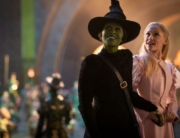The most significant film adaptation of Georges Bizet’s 1875 Carmen, so far, is Otto Preminger’s splashy 1954 musical Carmen Jones, starring Harry Belafonte and Dorothy Dandridge. It set the opera’s plot and music to Oscar Hammerstein II’s English libretto. In 2000, Matthew Bourne staged a ballet, The Car Man, mostly taking place in a rough Italian American 1960s auto shop. It was based less on Bizet and more on James M. Cain’s The Postman Always Rings Twice, with a splash of homoeroticism.
Despite its title and suggestions of dance and music, there is little in common with the famed opera, Preminger’s film, or Bourne’s ballet in Benjamin Millepied’s stark and austere feature, a musical getaway drama set along the U.S./Mexico border. Melissa Barrera stars as the titular character, and Paul Mescal plays a haunted American soldier who rescues her out of Mexico and brings her to the City of Angels. The result is a somewhat lumbering and an uneven film, with occasional moments of visual flair and kineticism and a striking score by Nicholas Britell.
Britell has composed notable, moving scores for Barry Jenkins’s Moonlight and If Beale Street Could Talk, and sturdy, driving works on Don’t Look Up, Battle of the Sexes, She Said, and HBO’s Succession. But with Carmen, he is clearly working at his highest level yet, with an even more developed experimental sensibility. The film opens with reverbed strings and piercing operatic voices. It is minimalist music and sometimes discomforting, sometimes composed of brass, organs, and harsh percussion (especially when accompanying the police, ICE raids, and rogue border patrol agents), but as the film continues, the score becomes more melodic and bittersweet as the bond and romantic relationship of the two leads deepen. The love theme, “Tú y Yo,” with its baroque pop influences—sounding naggingly a bit like the piano intro to Billy Joel’s “Honesty”—eventually blossoms into the lovely “Cello Impromptu in F Minor.” Britell also dabbles into tango, folk (Mescal’s voice unadorned with a strumming guitar on “Slip Away”), a growling punk rap number by Tracy “the D.O.C.” Curry (who figures in the story as a street fighter leader), and even eerie synths reminiscent of John Carpenter.
Millepied, a renowned choreographer and known for his fantastic work on Darren Aronofsky’s Black Swan, has some semblance of a cinematic vision, especially in working with cinematographer Jörg Widmer (A Hidden Life—Carmen has some parallels to the roaming camera in Terrence Malick’s films). The sunbaked rocky deserts and seedy, dark alleyways, of Mexico and Los Angeles were actually filmed in Australia. Perhaps because it’s filmed elsewhere, the movie has a sense of mystery and dreamy dislocation. The surrealistic stabs (like a figure donned in shards of reflective glass) or parallel visual cues (a burning house/a sudden brush fire) are the more evocative moments. Millepied’s dance sequences are vigorous as well, even if none of them truly stand out memorably—save for the opening flamenco by Carmen’s mother (Marina Tamayo) or maybe an impromptu scene of women in black Keds, set in an abandoned, desert fairground in front of a pendulum ride.
However, the thin story line and the generic, stilted dialogue weaken the movie considerably. Sometimes it feels merely a bit like a beautiful boy (Mescal, with his brawny, chiseled body in Levi’s) meets beautiful girl tale—while the border crisis is too real and grave to uphold such a flimsy narrative.
Mescal, potent in last year’s Aftersun, fares admirably. Barrera, of In the Heights and Scream VI, can be a performer of skillful physicality, but she buckles under in the more dramatic scenes. However, whenever Rossy de Palma (a Pedro Almodóvar regular) appears as LA nightclub owner Masilda, who is Carmen’s mother’s best friend, the film ignites. De Palma’s blue-lit costumes, glittery jewels, extravagant make-up, voice, and passionate acting are particularly dazzling. While there is some promise in Millepied as a filmmaker, it’s De Palma’s turn and Britell’s score that rouse the film awake from its more banal elements.







Leave A Comment